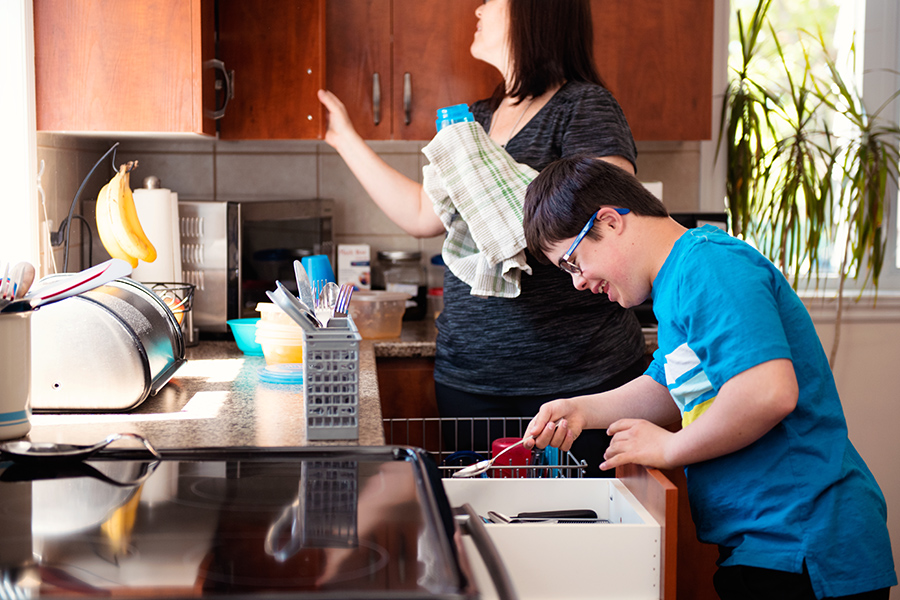Raising teens is hard. This is the point in time when hormones runs high, logic is often low, and eye rolling is real. Raising a teen with special needs means that you are parenting with your child’s specific needs in mind, and parenting in a way that helps them to build their sense of self and sense of self-confidence as a person. Adolescence is a time of immense physical and emotional growth, and of wanting independence. A teen with special needs is no different. Sometimes the timing may be different, but the process is the same.
Your Teen May Be Ready Before You Are
Your teen may be asking you to acknowledge them as an adolescent, but you haven’t progressed to that phase yet in your own mind. Many times, this comes from our own anxiety about what we think our teen can handle and how we don’t want them to be disappointed or embarrassed by their struggles. As parents, our natural instinct is to protect our child; it’s okay for your child to feel frustrated or feel disappointed. This is what builds grit and resilience.
Close your eyes and think about the image you have of your child. Do you still see your cute little kid running around with a Thomas the Train tucked under their tiny arm, or hugging their favorite doll? If so, take a good hard look at your teenager, close your eyes and imprint that image in your mind’s eye. Next time you think about your young adult’s capabilities, make sure you are looking at the latter image.
Set the Rules and Stick to Them
Teens thrive on consistency even though they will push your rules and limits hard. Set your rules and household guidelines, and consistently hold your child to them. It’s okay to be flexible and make an exception if you feel like your child is having a difficult day or moment, but stick to the guidelines that you’ve set. Those guidelines and expectations will be internalized for your child as their own.
Next, hold your teen to the same rules as you would for your other children, rather than making exceptions that may appear to be unfair or “easier” for your teen with special needs. Although your teen might point out theirr struggles as a way to get out of being held to certain expectations, together you can figure out a different approach to work towards the goal. The goal remains the same. This will serve to bolster self-esteem and help them to feel like an important and equal member of the family.
Give Them Responsibility
You may think, ‘my teenager doesn’t have the will or the ability,’ but every teenager needs a sense of responsibility and accountability, regardless of abilities. Gradually increase your teenager’s responsibilities, and provide encouragement and support. I know this may be tough for YOU, but curb your tendency to protect. By not giving your teen responsibility, you are subtly giving them the message that they ‘can’t do it’ or “don’t have the ability.” Although unintentional, that is the message that your teen will absorb.
Start small with little responsibilities or little chores, and add to their responsibilities as your teen shows that they are able to handle it. These responsibilities are also encouraging your child’s ability to problem solve, plan ahead, sequence, and complete a task. Not only are you helping your teenager begin to develop a sense of self efficacy, but you are helping them to develop great executive functioning skills as well.
Attach privileges or allowance to completion of chores. Giving your teen chores is giving the message that their contributions are important to helping your home operations run smoothly.
Set Your Standards and Set Them High
Sadly, standards for teens with special needs are sometimes not set as high as they can be. Expect more from your child. The less you expect from your child, the less they accomplish, but the more you expect, the more they are able to accomplish with your encouragement, support, and cheerleading.
As parents, we aim to raise independent people. Give your teen choices and let them follow through with the outcome. Don’t play out how things may happen if your teen chooses option A vs. B. Just say ‘okay’, sit back, and watch. Obviously you are not going to let your teen engage in potentially harmful behavior; however, take note of the process, and talk about the outcome.
Ask the questions:
- Are you satisfied with the outcome?
- If yes, what did you like about it?
- If no, what would you do differently?
- How do you think you might handle a similar situation in the future?
In essence, you are encouraging real world thinking… not thinking in theory. You are also not thinking for your teen.
Every teenager, whether typical or with special needs, needs these experiences in order to develop critical life-building skills. Your worries and fears are legitimate, but don’t let them hold your teen back from growing. Instead, focus on what your child does well and provide more opportunities for positive growth… for both of you!



























